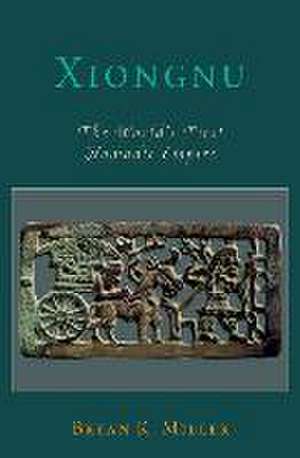Xiongnu: The World's First Nomadic Empire: Oxford Studies in Early Empires
Autor Bryan K. Milleren Limba Engleză Hardback – 18 dec 2024
Preț: 489.59 lei
Preț vechi: 673.97 lei
-27% Nou
Puncte Express: 734
Preț estimativ în valută:
93.68€ • 97.81$ • 77.53£
93.68€ • 97.81$ • 77.53£
Carte disponibilă
Livrare economică 03-10 martie
Preluare comenzi: 021 569.72.76
Specificații
ISBN-13: 9780190083694
ISBN-10: 0190083697
Pagini: 384
Ilustrații: 47, b/w
Dimensiuni: 163 x 168 x 25 mm
Greutate: 0.7 kg
Editura: Oxford University Press
Colecția OUP USA
Seria Oxford Studies in Early Empires
Locul publicării:New York, United States
ISBN-10: 0190083697
Pagini: 384
Ilustrații: 47, b/w
Dimensiuni: 163 x 168 x 25 mm
Greutate: 0.7 kg
Editura: Oxford University Press
Colecția OUP USA
Seria Oxford Studies in Early Empires
Locul publicării:New York, United States
Recenzii
Bryan Miller offers an intriguing and much needed treatment of eastern Eurasian history and archaeology that brings to light the latest excavation results from Mongolia, Siberia, and northern China, and articulates these discoveries expertly with the ancient historical texts on the Xiongnu nomadic state. With engaging insight and new interpretations, Miller reveals the power of Mongolian archaeology to transform our conventional understandings of nomadic peoples and their pivotal role in the making of East Asia.
Miller brilliantly interweaves Chinese primary sources and Mongolian, Russian, and Chinese archaeological research to liberate Xiongnu history from dualistic relations with Han Dynasty China. In Miller's re-envisioning, Xiongnu authority extended over diverse regional pastoral and agricultural societies across Eurasian steppe and desert, and the Xiongnu and Han were only two players in a multilateral 'Great Game' that encouraged far-flung political, economic, and cultural conflicts and exchanges well into the first century CE. The most pathbreaking book on Xiongnu history since Nicola Di Cosmo's Ancient China and Its Enemies.
Comprehensive and wide-reaching, Xiongnu explores the rise of the empire, details how the empire controlled nodes of wealth and far-flung power bases, and charts the slow and fractured decline of the Xiongnu empire. Throughout, Miller provides fascinating readings of burial goods, vibrant tellings of oath ceremonies, and careful interpretations of Chinese letters and histories. Xiongnu firmly brings its nomad protagonists onto center stage and into sharp focus, and this book is bound to appeal to those interested in archaeology, nomadic societies, and world history.
Miller brilliantly interweaves Chinese primary sources and Mongolian, Russian, and Chinese archaeological research to liberate Xiongnu history from dualistic relations with Han Dynasty China. In Miller's re-envisioning, Xiongnu authority extended over diverse regional pastoral and agricultural societies across Eurasian steppe and desert, and the Xiongnu and Han were only two players in a multilateral 'Great Game' that encouraged far-flung political, economic, and cultural conflicts and exchanges well into the first century CE. The most pathbreaking book on Xiongnu history since Nicola Di Cosmo's Ancient China and Its Enemies.
Comprehensive and wide-reaching, Xiongnu explores the rise of the empire, details how the empire controlled nodes of wealth and far-flung power bases, and charts the slow and fractured decline of the Xiongnu empire. Throughout, Miller provides fascinating readings of burial goods, vibrant tellings of oath ceremonies, and careful interpretations of Chinese letters and histories. Xiongnu firmly brings its nomad protagonists onto center stage and into sharp focus, and this book is bound to appeal to those interested in archaeology, nomadic societies, and world history.
Notă biografică
Bryan K. Miller is Assistant Professor of Central Asian Art & Archaeology in History of Art and Assistant Curator of Chinese Archaeology at the Museum of Anthropological Archaeology at the University of Michigan.














